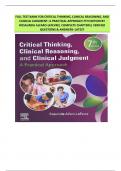FULL TEST BANK FOR CRITICAL THINKING, CLINICAL REASONING, AND
CLINICAL JUDGMENT: A PRACTICAL APPROACH 7TH EDITION BY
ROSALINDA ALFARO-LEFEVRE| COMPLETE CHAPTERS| VERIFIED
QUESTIONS & ANSWERS−LATEST
,Table of Contents
Chapter 1. What Are Critical Thinking, Clinical Reasoning, And Clinical Judgment? ................................. 2
Chapter 2. Becoming A Critical Thinker ..................................................................................................... 10
Chapter 3. Critical Thinking And Learning Cultures: Teaching, Learning, And Taking Tests .................... 19
Chapter 4. Clinical Reasoning, Clinical Judgment, and Decision-Making ................................................. 32
Chapter 5. Ethical Reasoning, Professionalism, Evidence-Based Practice, And Quality Improvement .. 45
Chapter 6. Practicing Clinical Reasoning, Clinical Judgment, And Decision-Making Skills ...................... 72
Chapter 7. Interprofessional Practice Skills: Communication, Teamwork, And Self-Management ........ 92
Chapter 1. What Are Critical Thinking, Clinical Reasoning, And Clinical
Judgment?
Multiple Choice
Identify The Choice That Best Completes The Statement Or Answers The Question.
1. Which Of The Following Characteristics Do The Various Definitions Of Critical Thinking Have In
Common? Critical Thinking
1) Requires Reasoned Thought
2) Asks The Questions Why? Or How?
3) Is A Hierarchical Process
4) Demands Specialized Thinking Skills
ACCURATE ANS>>1
The Definitions Listed In The Text As Well As Definitions In Box 2-1 State That Critical Thinking Requires
Reasoning Or Reasoned Thinking. Critical Thinking Is Neither Linear Nor Hierarchical. That Means That
The Steps Involved In Critical Thinking Are Not Necessarily Sequential, Where Mastery Ofone Step Is
Necessary To Proceed To The Next. Critical Thinking Is A Purposeful, Dynamic, Analytic Process That
Contributes To Reasoned Decisions And Sound Contextual Judgments.
PTS: 1DIF: Moderate High-Level Question, Answer Not Stated Verbatim
KEY: Nursing Process: N/A | Client Need: SECE | Cognitive Level: Analysis
2. A Few Nurses On A Unit Have Proposed To The Nurse Manager That The Process For
Documenting Care On The Unit Be Changed. They Have Described A Completely New System. Why Isit
Important For The Nurse Manager To Have A Critical Attitude? It Will Help The Manager To
1) Consider All The Possible Advantages And Disadvantages
2) Maintain An Open Mind About The Proposed Change
,3) Apply The Nursing Process To The Situation
4) Make A Decision Based On Past Experience With Documentation
ACCURATE ANS>>2
A Critical Attitude Enables The Person To Think Fairly And Keep An Open Mind. PTS: 1DIF: Moderate KEY:
Nursing Process: N/A | Client Need: SECE | Cognitive Level: Comprehension
3. The Nurse Has Just Been Assigned To The Clinical Care Of A Newly Admitted Patient. To Know
How To Best Care For The Patient, The Nurse Uses The Nursing Process. Which Step Would Thenurse
Probably Do First?
1) Assessment
2) Diagnosis
3) Plan Outcomes
4) Plan Interventions
ACCURATE ANS>>1
Assessment Is The First Step Of The Nursing Process. The Nursing Diagnosis Is Derived From The Data
Gathered During Assessment, Outcomes From The Diagnosis, And Interventions From The Outcomes.
PTS: 1DIF: Easy
KEY: Nursing Process: Assessment | Client Need: SECE | Cognitive Level: Application
4. Which Of The Following Is An Example Of Theoretical Knowledge?
1) A Nurse Uses Sterile Technique To Catheterize A Patient.
2) Room Air Has An Oxygen Concentration Of 21%.
3) Glucose Monitoring Machines Should Be Calibrated Daily.
4) An Irregular Apical Heart Rate Should Be Compared With The Radial Pulse.
ACCURATE ANS>>2
Theoretical Knowledge Consists Of Research Findings, Facts, Principles, And Theories. The Oxygen
Concentration Of Room Air Is A Scientific Fact. The Others Are Examples Of Practical Knowledgewhat To
Do And How To Do It.
PTS: 1DIF: Moderate; High-Level Question, Answer Not Stated Verbatim
KEY: Nursing Process: N/A | Client Need: SECE | Cognitive Level: Application
5. Which Of The Following Is An Example Of Practical Knowledge? (Assume All Are True.)
, 1) The Tricuspid Valve Is Between The Right Atrium And Ventricle Of The Heart.
2) The Pancreas Does Not Produce Enough Insulin In Type 1 Diabetes.
3) When Assessing The Abdomen, You Should Auscultate Before Palpating.
4) Research Shows Pain Medication Given Intravenously Acts Faster Than By Other Routes.
ACCURATE ANS>>3
Practical Knowledge Is Knowing What To Do And How To Do It, Such As How To Do An Assessment. The
Others Are Examples Of Theoretical Knowledge, Anatomy (Tricuspid Valve), Fact (Type 1 Diabetes), And
Research (IV Pain Medication).
PTS: 1DIF: Moderate High-Level Question, Answer Not Stated Verbatim
KEY: Nursing Process: N/A | Client Need: SECE | Cognitive Level: Application
6. Which Of The Following Is An Example Of Self-Knowledge?
The Nurse Thinks, I Know That I
1) Should Take The Clients Apical Pulse For 1 Minute Before Giving Digoxin
2) Should Follow The Clients Wishes Even Though It Is Not What I Would Want
3) Have Religious Beliefs That May Make It Difficult To Take Care Of Some Clients
4) Need To Honor The Clients Request Not To Discuss His Health Concern With The Family
ACCURATE ANS>>3
Self-Knowledge Is Being Aware Of Your Religious And Cultural Beliefs And Values. Taking The Pulseis An
Example Of Practical Knowledge. Following Client Wishes And Honoring Client Requests Are Examples Of
Ethical Knowledge.
PTS: 1dififficult; High-Level Question, Answer Not Stated Verbatim | V1, High-Level Question, Answer
Not Stated Verbatim
KEY: Nursing Process: N/A | Client Need: SECE | Cognitive Level: Application
7. Which Of The Following Is The Most Important Reason For Nurses To Be Critical Thinkers?
1) Nurses Need To Follow Policies And Procedures.
2) Nurses Work With Other Healthcare Team Members.
3) Nurses Care For Clients Who Have Multiple Health Problems.
4) Nurses Have To Be Flexible And Work Variable Schedules.
ACCURATE ANS>>3
Critical Thinking Is Essential For Client Care, Particularly When The Care Is Complex, Involving Numerous
Health Issues. Following Policies And Procedures Does Not Necessarily Require Critical Thinking, And




